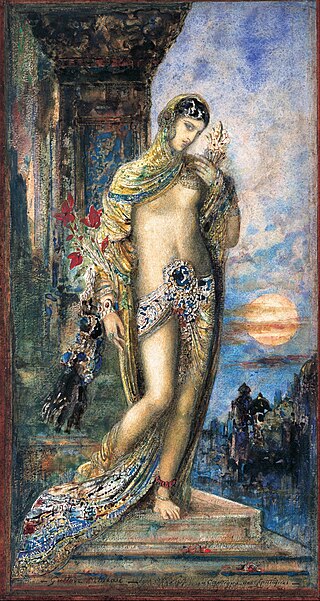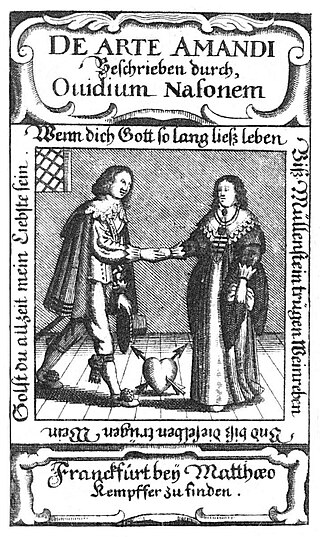
The Song of Songs, also called the Canticle of Canticles or the Song of Solomon, is a biblical poem, one of the five megillot ("scrolls") in the Ketuvim ('writings'), the last section of the Tanakh. It is unique within the Hebrew Bible: it shows no interest in Law or Covenant or the God of Israel, nor does it teach or explore wisdom, like Proverbs or Ecclesiastes—although it does have some affinities to wisdom literature, as the ascription to the 10th-century BCE King of Israel Solomon indicates. Instead, it celebrates sexual love, giving "the voices of two lovers, praising each other, yearning for each other, proffering invitations to enjoy".
The Wiccan Rede is a statement that provides the key moral system in the neopagan religion of Wicca and certain other related witchcraft-based faiths. A common form of the Rede is "An ye harm none, do what ye will" which was taken from a longer poem also titled the Wiccan Rede.

Etiquette is the set of norms of personal behaviour in polite society, usually occurring in the form of an ethical code of the expected and accepted social behaviours that accord with the conventions and norms observed and practised by a society, a social class, or a social group. In modern English usage, the French word étiquette dates from the year 1750.

Courtly love was a medieval European literary conception of love that emphasized nobility and chivalry. Medieval literature is filled with examples of knights setting out on adventures and performing various deeds or services for ladies because of their "courtly love". This kind of love was originally a literary fiction created for the entertainment of the nobility, but as time passed, these ideas about love spread to popular culture and attracted a larger literate audience. In the high Middle Ages, a "game of love" developed around these ideas as a set of social practices. "Loving nobly" was considered to be an enriching and improving practice.

Judith Martin, better known by the pen name Miss Manners, is an American columnist, author, and etiquette authority.

Medieval literature is a broad subject, encompassing essentially all written works available in Europe and beyond during the Middle Ages. The literature of this time was composed of religious writings as well as secular works. Just as in modern literature, it is a complex and rich field of study, from the utterly sacred to the exuberantly profane, touching all points in between. Works of literature are often grouped by place of origin, language, and genre.

Decorum was a principle of classical rhetoric, poetry, and theatrical theory concerning the fitness or otherwise of a style to a theatrical subject. The concept of decorum is also applied to prescribed limits of appropriate social behavior within set situations.

The Ars amatoria is an instructional elegy series in three books by the ancient Roman poet Ovid. It was written in 2 AD.

Adab in the context of behavior, refers to prescribed Islamic etiquette: "refinement, good manners, morals, decorum, decency, humaneness". Al-Adab has been defined as "decency, morals".

A mistress or kept woman is a woman who is in a relatively long-term sexual and romantic relationship with someone who is married to a different person.
Islamic ethics is the "philosophical reflection upon moral conduct" with a view to defining "good character" and attaining the "pleasure of God". It is distinguished from "Islamic morality", which pertains to "specific norms or codes of behavior".
"O Florida, Venereal Soil" is a poem from Wallace Stevens's first book of poetry, Harmonium. It was first published in the journal Dial, volume 73, July 1922, and is therefore in the public domain.

"Advice to a Friend on Choosing a Mistress" is a letter by Benjamin Franklin dated June 25, 1745, in which Franklin counsels a young man about channeling sexual urges. Due to its licentious nature the letter was not published in collections of Franklin's papers in the United States during the 19th century. Federal court decisions from the mid- to late- 20th century cited the document as a reason for overturning obscenity laws.
A courtesy book was a didactic manual of knowledge for courtiers to handle matters of etiquette, socially acceptable behaviour, and personal morals, with an especial emphasis upon life in a royal court; the genre of courtesy literature dates from the 13th century.
Foebus abierat is a medieval Latin poem, authorship unknown, composed near the end of the 10th century in Northern Italy. Described as "hauntingly beautiful" and "one of the joys of medieval poetry," it is an erotic dream-vision lyric spoken by a woman who grieves the departure of her lover Phoebus, brother of the Moon. Although the language is ecclesiastical Latin, none of its content is explicitly Christian.
Major anarchist thinkers, past and present, have generally supported women's equality. Free love advocates sometimes traced their roots back to Josiah Warren and to experimental communities, viewing sexual freedom as an expression of an individual's self-ownership. Free love particularly stressed women's rights. In New York's Greenwich Village, "bohemian" feminists and socialists advocated self-realisation and pleasure for both men and women. In Europe and North America, the free love movement combined ideas revived from utopian socialism with anarchism and feminism to attack the "hypocritical" sexual morality of the Victorian era.
Susan Treggiari is an English scholar of Ancient Rome, emeritus professor of Stanford University and retired member of the Faculty of Classics at the University of Oxford. Her specialist areas of study are the family and marriage in ancient Rome, Cicero and the late Roman Republic.
In medieval Europe, attitudes toward homosexuality varied from region to region, determined by religious culture; the Catholic Church, which dominated the religious landscape, considered, and still considers, sodomy as a mortal sin and a "crime against nature". By the 11th century, "sodomy" was increasingly viewed as a serious moral crime and punishable by mutilation or death. Medieval records reflect this growing concern. The emergence of heretical groups, such as the Cathars and Waldensians, witnesses a rise in allegations of unnatural sexual conduct against such heretics as part of the war against heresy in Christendom. Accusations of sodomy and "unnatural acts" were levelled against the Order of the Knights Templar in 1307 as part of Philip IV of France's attempt to suppress the order. These allegations have been dismissed by some scholars.
Isabella Whitney's 16th-century poem "To her unconstant Lover" is the first in her first book The Copy of a Letter, Lately Written in Meter by a Young Gentlewoman: to her Unconstant Lover (1567). The speaker is Whitney herself, who is, as the title of the poem indicates, writing to her unfaithful, or inconstant lover.
Medieval female sexuality is the collection of sexual and sensual characteristics identified in a woman from the Middle Ages. Like a modern woman, a medieval woman's sexuality included many different aspects. Sexuality does not only refer to a woman's sexual activity, as sexual lives were as social, cultural, legal, and religious as they were personal.









